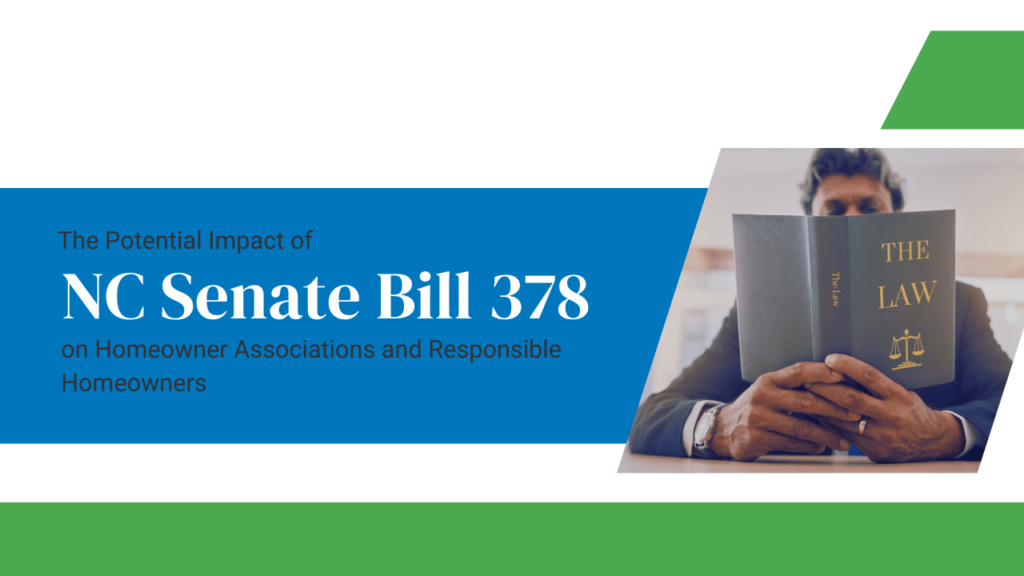
North Carolina Senate Bill 378 has been a topic of much debate and concern among homeowners and homeowner associations (HOAs) across the state. This bill, introduced with the intention of reforming the governance and financial practices of HOAs, has raised significant alarm due to its potential to harm homeowner associations and unduly burden responsible homeowners. In this blog, we will explore the key provisions of SB 378, its potential negative impacts on HOAs, and the unintended consequences for diligent homeowners.
Understanding NC Senate Bill 378
Senate Bill 378 proposes several changes to the way HOAs operate in North Carolina. Some of the key provisions of the bill include:
- Increased transparency requirements for HOAs, including mandatory financial disclosures and open board meetings.
- Stricter regulations on the imposition of fines and fees by HOAs.
- Enhanced protections for homeowners against arbitrary and excessive enforcement actions by HOAs.
- Limits on the power of HOAs to foreclose on properties for unpaid dues and fines.
While these provisions may appear beneficial on the surface, they carry significant implications that could destabilize HOAs and place undue burdens on responsible homeowners.
The Potential Harm to Homeowner Associations
 Homeowner associations play a crucial role in maintaining the quality and value of residential communities. They enforce rules and regulations, manage common areas, and ensure that the neighborhood remains a desirable place to live. However, SB 378 threatens to undermine the effectiveness of HOAs in several ways:
Homeowner associations play a crucial role in maintaining the quality and value of residential communities. They enforce rules and regulations, manage common areas, and ensure that the neighborhood remains a desirable place to live. However, SB 378 threatens to undermine the effectiveness of HOAs in several ways:
1. Increased Administrative Burden
The requirement for increased transparency and mandatory disclosures will create a significant administrative burden for HOAs. Smaller associations, in particular, may struggle to comply with these requirements due to limited resources and volunteer-based management. This could lead to higher administrative costs, which may ultimately be passed on to homeowners in the form of increased dues.
2. Weakened Enforcement Capabilities
By imposing stricter regulations on fines and enforcement actions, SB 378 could weaken the ability of HOAs to uphold community standards. Without the threat of meaningful consequences, some homeowners may be more inclined to ignore rules and regulations, leading to a decline in property values and overall community quality. This erosion of enforcement power could also create a sense of unfairness among residents who diligently follow the rules.
3. Financial Instability
Limits on the power of HOAs to foreclose on properties for unpaid dues could result in financial instability for associations. HOAs rely on the timely payment of dues to fund essential services and maintenance. If homeowners are emboldened by reduced foreclosure risks, the delinquency rate may rise, leading to budget shortfalls and deferred maintenance. This could result in a deteriorating community environment and higher costs for all residents.
The Burden on Responsible Homeowners

While SB 378 aims to protect homeowners from excessive HOA actions, it may inadvertently place additional burdens on those who already act responsibly:
1. Higher Costs
As HOAs face increased administrative costs and potential financial instability, responsible homeowners may bear the brunt of these expenses. Higher dues and special assessments may become necessary to cover the additional costs, placing a financial strain on those who consistently pay their dues on time.
2. Reduced Property Values
Weakened enforcement capabilities and financial instability within HOAs could lead to a decline in property values. Responsible homeowners who have invested time and money into maintaining their properties may see their investments diminish due to the actions of less responsible neighbors and the overall decline in community standards.
3. Increased Tensions and Conflicts
The provisions of SB 378 may lead to increased tensions and conflicts within communities. As HOAs struggle to enforce rules and maintain financial stability, disputes between homeowners and associations are likely to rise. Responsible homeowners may find themselves caught in the middle of these conflicts, experiencing increased stress and frustration.
Conclusion
While the intentions behind North Carolina Senate Bill 378 may be well-meaning, the potential consequences for homeowner associations and responsible homeowners cannot be overlooked. The increased administrative burden, weakened enforcement capabilities, and financial instability that may result from this legislation could harm the very communities it seeks to protect. It is crucial for lawmakers to carefully consider the unintended consequences of SB 378 and seek a balanced approach that safeguards the interests of both HOAs and diligent homeowners. Only through thoughtful and nuanced legislation can we ensure the continued vitality and desirability of residential communities in North Carolina.

